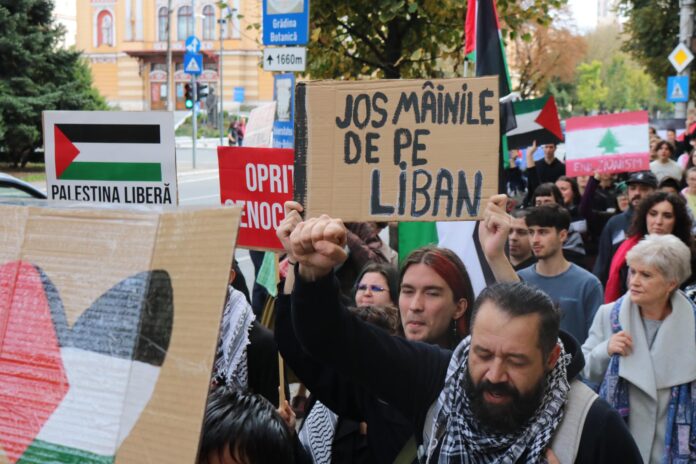As one year has passed since Israel began its genocidal offensive against the people of Gaza, supported by Western imperialist forces, protesters flooded the streets of major cities worldwide to reject their governments’ complicity in the massacre. In Romania, demonstrations took place in Bucharest and Cluj, while in other cities such as Brașov, grassroots groups opposing the massacre of Palestinians have already been established.
Although Romania is one of the few EU countries that recognize the Palestinian Authority and maintains diplomatic relations with it (through the Palestinian Embassy), the Romanian ruling class remains highly complicit in the crimes against Palestinians. Romania ceased its funding of UNRWA this year, while allowing Elbit Systems, a global Israeli arms manufacturer, to operate multiple facilities in the country and secure new contracts with local companies. During this same year, as Palestinians faced bombings and ethnic cleansing, Romania passed a law declaring May 14 as the “Day of Friendship with the Israeli State.” Major universities also collaborate with questionable companies in the arms industry, such as the Technical University of Cluj, which sends its students for internships at Lockheed Martin. A wave of protests and encampments occurred at the start of the summer, but the students’ demands were largely ignored by university administrations, with more serious repression occurring in Bucharest.
Below the speech used for intervention in the current protests by the Socialist Action Group (GAS), the ISp affiliate in Romania:
The last 12 months have brought unimaginable suffering to the people of Gaza—suffering that is impossible to describe in ordinary words. For ordinary people elsewhere, whether in the Levant, Europe, or America, these 12 months have been marked by a profound sense of powerlessness. We say ‘powerlessness’ because their opposition—our opposition—to the genocide in Gaza and to war, expressed through street protests and clear in all opinion polls that dared to ask, has been ignored by our governments and politicians. This is an absolute betrayal of any notion of supposed political representation by the so-called democracies of Europe and North America. And we say ‘so-called’ because, as we often know, corporations make the laws—particularly the arms manufacturing corporations in this case.
On the other hand, countries in Asia, Africa, and South America have found themselves caught in the same geopolitical stalemates as always, unable to take decisive action against genocide and the war machine. These last 12 months have exposed the chaos and precariousness of the political world as we know it—the unreality and absurdity at its core.
But it hasn’t been a bad year for everyone. Military companies have seen their profits soar. Arms factories have secured new contracts, increased their profits, and expanded their workforces. Companies producing drones, drone software, simulators to train pilots, and security solutions for the military certainly have no complaints. For instance, Elbit Systems, an Israeli military company, has three subsidiaries and four factories in Romania. These companies manufacture drone components and software for military pilots. Since the genocide began, they’ve also secured a new agreement to manufacture artillery in Moreni.
Of course, Romania isn’t unique in this regard. These companies are global corporations. Like all corporations, they set up offices wherever they are allowed, move their capital to tax havens, and fragment their production—one component here, another component there—until it’s nearly impossible to hold anyone accountable. And for them, this past year has meant growth and profit.
The year ahead looks bright for them too. The escalation of war in Lebanon, which will devastate the region and destabilize our lives—geopolitically, strategically, and humanitarily—translates, for some, into favorable predictions and rising green lines on a graph.
Behind these calculations are businessmen who remain indifferent to the state of the world, as it doesn’t affect them. They live isolated in their mansions and yachts, protected by near-total anonymity—newspapers don’t write about them, and governments allow them to hide their interests through a network of shell companies. Meanwhile, our faces are scanned, cataloged, and checked every time we enter the perimeter of this protest. Be safe in knowing this: these people see our lives, the lives of the children of Gaza, the people of Lebanon, as nothing more than components in the production line of the war machine—their war machine.
Who actually builds this war machine that we’re fighting against? Ordinary people: everyday workers polishing parts, engineers designing blueprints, ammunition handlers, programmers, graphic artists illustrating manuals, harbor workers. People with very little control over their work. The state of the world surely affects them, but they respond with resignation because changing it feels impossible.
But the responsibility of this moment—one of the responsibilities, for it’s not the only thing that matters, but still a vital one—is to reject the war machine. We must say no to those who profit from it, and we must remind those who directly build it of their power. It is through our labor that we uphold the system that makes genocide possible—and thus, we can also dismantle it.
We call on every one of you to hold your employers, universities, institutions, and so-called political representatives accountable for contributing to the genocide in Gaza and to the war machine of imperialist forces in general. Do not fear using the disruption of your activities as a means of negotiation and assertion of your power. The students who set up tents in university courtyards this summer—in Cluj, in Bucharest, and around the world—have paved the way for this and shown that there is strength in our unity. Together, we cannot be repressed or silenced without consequences. Let’s generalize the revolt!
Photos from Cluj
Photos from Bucharest
Video of intervention



